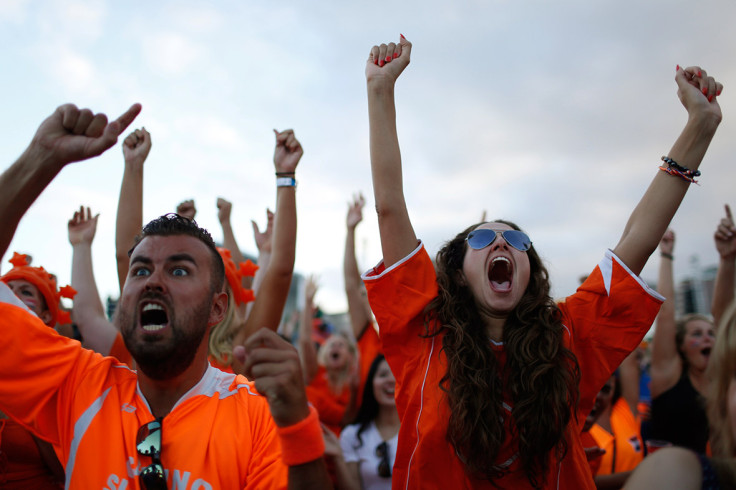Dutch courage? Six things we call Dutch for no good reason
Ever wondered where the expressions 'Double Dutch' and 'going Dutch' come from?

A number of expressions in the English language make a reference to Dutch customs or habits, but mostly assume a negative connotation.
Some of these expressions are as old as the 17th and 18th century, a time in which England and the Netherlands fought several wars to secure maritime dominance. The rivalry helps to explain why in many expressions, such as 'Dutch bargain' or 'Dutch defence', the adjective becomes synonymous with something deceitful, misleading or disappointing.
Over the course of time, many expressions referring to Dutch habits and quirks originated and spread in the English language. We list six here.
What does it mean to 'go Dutch'?
'Going Dutch' refers to the practice of having each person pay for their share of a meal.
While in some countries people fight over each other to pay for the overall bill fearing to be seen as 'cheap', in the Netherlands there is nothing shameful in demanding that people pay for themselves. Indeed, waiters in the Netherlands are so accustomed to the practice that they will often ask if people are paying together or separately, even when facing a sizeable dinner group.
A fast-food ad from 2010 embraces the quirk. In the ad, a heterosexual couple is seen enjoying a dinner date, when the guy suddenly asks: "Hey, you owe me money... for the burger", handing over the receipt to his date and showing the exact amount owed.
What is a Dutch oven and what does it mean?
Dutch oven is one of Google's most popular searchable suggestions for the word 'Dutch'. In its original meaning, it is simply a thick-walled cooking pot with a tight-fitting lid, which can also be used to cook outside, hanging on a tripod.
But the term has lately taken on a new meaning. To 'Dutch oven' someone involves passing wind underneath the bed sheets and forcing someone else to smell it.
In honor of the populist movement brewing in the upcoming Dutch elections, greet your significant other with a Dutch Oven tomorrow morning.
— CarolinaAlpha78 (@Heel78) March 15, 2017
What is a Dutchie?
The word Dutchie honours the Netherlands' pioneering role in turning a blind eye to the consumption of soft drugs. While nowadays countries such as Portugal and several US states have decriminalised or fully legalised the consumption of marijuana, the 1976 law tolerating small amount of possessions of weed and consumption in designated areas was unique in the world and contributed to the country's reputation for tolerance and progressive ideas.
The 1982 song Pass the Dutchie by Musical Youth not only popularises the tolerant drug policy in the Netherlands, but also addresses the age-old question: How should you circulate a joint when smoking in a circle?
What does Dutch courage mean?
The phrase 'Dutch courage' refers to drinking liquor, specifically gin, to bolster one's confidence – and dates back to 1826. Dutch physician Franciscus Sylvius is credited with inventing gin in the mid 17th century. When British troops fought alongside their allies in the Low Countries against French King Louis XIV, they started drinking Dutch gin, known as Jenever, to calm themselves before heading into battle. By the 18th century gin was widely available in London.
What does Double Dutch mean?
'Double Dutch' means an incomprehensible language or gibberish. This phrase also dates back to the 18th century when the English and Dutch fought against each other in the Anglo-Dutch Wars for the control of trade and colonies. The English sailors found it so difficult to understand their rivals that they invented the phrase to describe the gibberish talk they heard.
The term took on a very different meaning twenty years ago, when people referred to the use of both a condom and the pill during sex as 'double Dutch'.
The phrase has a third common meaning, as it also refers to a skipping rope game. 'Double Dutching' involves two people swinging long ropes in opposite directions while one or more jumpers performs different tricks and break dance moves.
What does Flying Dutchman mean?
The Flying Dutchman is a legendary ghost ship that is never able to harbour anywhere and is therefore doomed to sail the ships forever. Legend has it that it refers to a vessel which sank in 1641 after its captain, Hendrick van der Decken, murdered his own crew in a frenzy and incurred the wrath of God. As punishment he and his crew were forced to wander the seas for eternity.
The legend inspired the writers of the Pirates of the Caribbean film series. Johnny Depp's character, Jack Sparrow, owes a debt to the ship's Captain Davy Jones and is chased across the seven seas by the ghostly vessel.
© Copyright IBTimes 2025. All rights reserved.






















